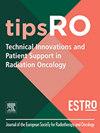Catheter removal after interstitial brachytherapy for breast cancer: Feasibility study for task delegation
Q1 Nursing
Technical Innovations and Patient Support in Radiation Oncology
Pub Date : 2024-07-10
DOI:10.1016/j.tipsro.2024.100261
引用次数: 0
Abstract
Purpose
This study aims to assess the impact of delegating brachytherapy device removal to radiation therapists (RTTs) in the treatment of breast cancer, in terms of safety and efficacy of treatment.
Material and Methods
A retrospective, observational study was conducted to analyze breast cancer brachytherapy patients. Standardized protocols were drawn up and the RTTs were gradually trained to remove brachytherapy devices under medical supervision.
Results
423 patients were included in the study over a period of 15 years. The move to involve RTTs in device removal did not lead to a significant increase in complications. Efficient management of complications was observed, with a stable rate of complications whatever the indication for treatment.
Conclusion
Delegating removal of brachytherapy devices to RTTs is a move towards the optimization of breast cancer care. This inter-professional approach guarantees diligent, safe care for patients while offering RTTs new opportunities for career development.
乳腺癌间质近距离放射治疗后移除导管:任务授权的可行性研究
目的 本研究旨在评估在乳腺癌治疗中委托放射治疗师(RTTs)移除近距离放射装置对治疗安全性和有效性的影响。研究制定了标准化方案,并逐步培训 RTTs 在医疗监督下移除近距离放射装置。让康复治疗师参与拆除装置的举措并没有导致并发症的显著增加。结论将近距离放射治疗装置的移除工作委托给 RTT 是优化乳腺癌治疗的一项举措。这种跨专业的方法保证了对患者的悉心、安全护理,同时也为 RTT 提供了新的职业发展机会。
本文章由计算机程序翻译,如有差异,请以英文原文为准。
求助全文
约1分钟内获得全文
求助全文
来源期刊

Technical Innovations and Patient Support in Radiation Oncology
Nursing-Oncology (nursing)
CiteScore
4.10
自引率
0.00%
发文量
48
审稿时长
67 days
 求助内容:
求助内容: 应助结果提醒方式:
应助结果提醒方式:


